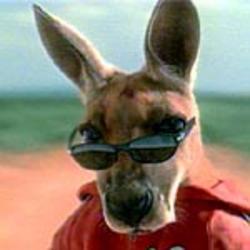AUSTRALIAN scientists are trying to give kangaroo-style stomachs to cattle and sheep in a bid to cut the emission of greenhouse gases blamed for global warming, researchers say.
Thanks to special bacteria in their stomachs, kangaroo flatulence contains no methane and scientists want to transfer that bacteria to cattle and sheep who emit large quantities of the harmful gas.
While the usual image of greenhouse gas pollution is a billowing smokestack pushing out carbon dioxide, livestock passing wind contribute a surprisingly high percentage of total emissions in some countries.
"Fourteen per cent of emissions from all sources in Australia is from enteric methane from cattle and sheep," said Athol Klieve, a senior research scientist with the Queensland Government.
"And if you look at another country such as New Zealand, which has got a much higher agricultural base, they're actually up around 50 per cent," he said.
Researchers say the bacteria also makes the digestive process much more efficient and could potentially save millions of dollars in feed costs for farmers.
"Not only would they not produce the methane, they would actually get something like 10 to 15 per cent more energy out of the feed they are eating," said Mr Klieve.

According to the article, some Australian scientists go even further and suggest that people modify their diets by replacing beef and lamb with kangaroo meat.
The idea is controversial, but about 20 per cent of health-conscious Australians are believed to eat the national symbol already.
"It's low in fat, it's got high protein levels it's very clean in the sense that basically it's the ultimate free range animal,'' said Peter Ampt of the University of New South Wales's institute of environmental studies.
"It doesn't get drenched, it doesn't get vaccinated, it utilises food right across the landscape, it moves around to where the food is good, so yes, it's a good food.''



 Headlines via e-mail
Headlines via e-mail


